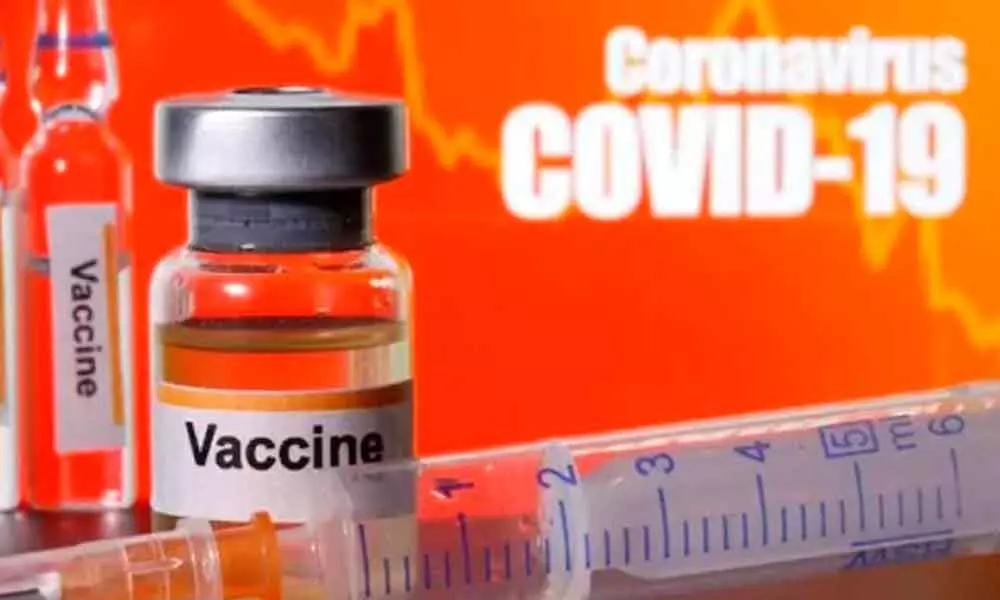All eyes on Hyderabad, the vaccine hub
Envoys of 80 nations visiting Bharat Biotech and Biological E facilities
image for illustrative purpose

The purpose of the visiting dignitaries is to familiarise themselves of the progress, capabilities and perhaps discuss the way forward to put in place a large scale vaccination in their respective countries
Emergency Authrisation sought for Covid-19 vaccine:
• Bharat Biotech-NIV consortia
• Pfizer India
• Oxford University-Astra Zeneca-SII
The global chase for effective vaccines against Covid-19 is witnessing dramatic developments. The UK gave the 'green signal', for the Pfizer, BioNTech Vaccine last week. The US Food & Drug Administration & EU will examine the emergency authorisation sought by Moderna Inc and Pfizer very soon as the country seeks a huge spike in cases touching a lakh a day and deaths in thousands.
In India, which is one of the biggest markets with its 1.3 billion population, the hopes gave been pushed up with Pfizer and the Oxford University-Astra Zeneca- Serum Institute of India (SII) seeking 'emergency authorisation', to launch their vaccines. Bharat Biotech-NIV consortia too have applied for emergency authorisation.
Meanwhile, the world focus will be on Hyderabad on December 9. Envoys of at least 80 nations are descending on the city, which is the 'Vaccine Hub' of India and touted to emerge as the global 'hot spot', for manufacture of a range of Covid-19 vaccines. The purpose of the visiting dignitaries is to familiarise themselves of the progress, capabilities and perhaps discuss the way forward to put in place a large scale vaccination in their respective countries. They will be visiting the Bharat Biotech and Biological E facilities, where both research and production activities are at advanced stages.
The Hyderabad Advantage
Hyderabad, well known as the 'Bulk Drug capital' of the country over the past 50 years, with the public sector, Indian Drugs & Pharmaceuticals (IDPL), spawning scores of companies, has also a sound base for vaccine manufacturing.
Starting from Biological E in the 1960s, the city has seen the impressive growth of Shantha Biotech (now owned by French major Sanofi) and Bharat Biotech, starting from the making of hepatitis B vaccine.
In addition, the Indian Immunological Limited (IIL), Brilliant Pharma etc carved their niche in vaccines for animals. Consequently, the infrastructure and R&D facilities have been growing over the decades.
If the Pune-based Serum Institute of India (SII), producing around 2 billion doses per year of vaccines has half of the global capacity, Bharat Biotech, Biological E, Shantha Sanofi have build both significant production and range in vaccines. For example, Bharat Biotech now makes 16 vaccines. These companies are certified by vaccine procuring organisations like the UNICEF and WHO. Further, they are major suppliers to the Bill & Melinda Gates Foundation and the GAVI (Global Alliance for Vaccine Initiative), the largest procurers.
The Covid-19 challenge to produce a vaccine has pitchforked many of these companies into the limelight. Given the huge, international demand, IIL has also entered the fray.
From the pharma world, giants like Dr Reddy's, Aurobindo Pharma and Hetero Pharma too have firmed up tie-ups with global and Indian vaccine developers to offer their expertise in trials to manufacture. These companies are globally established in generic drugs to research efforts. Some of the like Hetero & Aurobindo have played a huge part in producing affordable anti Retrovirals (ARVs) to manage HIV/AIDS, especially in African countries.
In short, the gigantic demand both in the domestic and global market offer a huge opportunity for these companies. As Bill Gates, Microsoft founder and driving the Bill & Melinda Foundation says, India will be the key player for Covid-19 vaccines and produce more than half the world's demand.
Current Scenario
There are four potential vaccines which have come to the stage of administering in humans. They are the Pfizer, BioNTech and Moderna, which are mRNA based (messenger ribonuclease acid). The Oxford-Astra Zeneca-SII and the Russian Sputnik V are 'Attenuated types'. The indigenous one under development at Bharat Biotech with the National Institute of Virology (NIV), Pune too is the 'Live Attenuated' type. It is undergoing Phase 3 human trials and is expected to be ready in a couple of months. The mRNA is a new platform for developing vaccines. There are no such vaccines in the market. Hence, there is no data on long term impact on humans and safety. The one for Covid-19 will be the first. However, the developers claim that they will be effective (Pfizer claimed 90 per cent while Moderna claimed 94.5 per cent).
In addition to non availability of safety data, these vaccines require highly efficient (minus 70 degrees C) storage facilities. The costs too are high, with the companies quoting $25-$35 per shot. To be effective, each person has to take two doses.
In contrast, the Sputnik V & Oxford ones are 'Attenuated vaccines', where the pathogen is live but at 100 times less virulent. The flu, MMR vaccine is in the same mould. All vaccines, when injected help in raising the body's immunity or defence mechanism to fight the specific pathogen that has invaded. In the Indian context, the Sputnik V & Oxford vaccine along with the future Covaxin under final stage development from Bharat Biotech could be best suited in terms of storing, administering and affordability. The SII has quoted the price of around Rs 350-500 per shot in India.
When the 80 envoys visit the facilities and discuss with the companies & scientists, the Telangana Government also plans to showcase its ambitious plans to raise its potential in the production and supply of vaccine, with emphasis on the plans that include the Pharma City and Genome Valley.
(The writer is an Independent Journalist & former Associate Editor of The Hindu Business Line)
M Somasekhar

